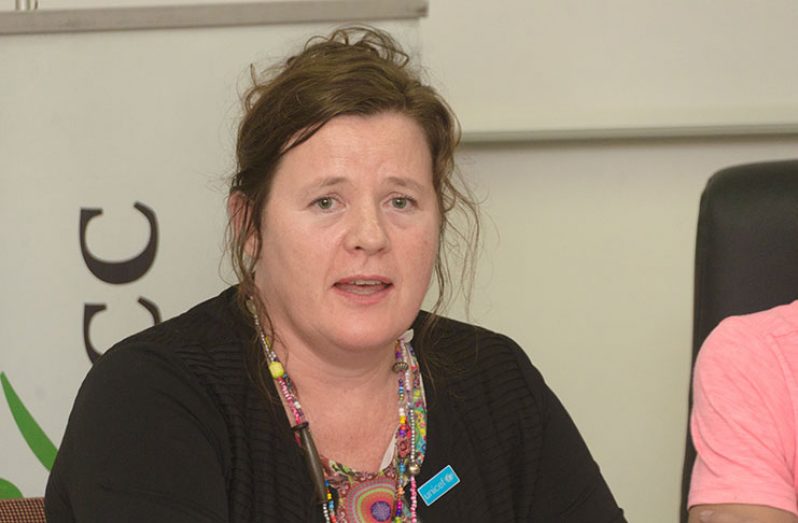WITHIN the next six months Guyana is likely to have a youth court established, representative of the United Nations Children’s Fund (UNICEF) in Guyana and Suriname, Sylvie Fouet, disclosed on Friday.
Fouet, during a media briefing hosted by the Rights of the Child Commission (RCC), told reporters that the court is likely to be opened “by summer,” while citing Jamaica and Barbados as examples of regional territories which have youth courts.
With work starting just over a year ago in this regard, the UNICEF head said, “We are calling on the government to bring a youth court to [address] particular cases faster and this is something we hope to see happening in 2018.”
She explained that the right to speedy trials for all but particularly children, must be taken seriously. The envoy said the length of time the justice system takes to hear cases involving children is woefully unacceptable.
Fouet stressed the need for cases to be dealt with expeditiously, while referencing the case of 19-year-old Eon Henry who for almost seven years was in state detention on remand after being charged with murder back in 2011. Henry was this week freed by the director of public prosecutions (DPP), due to the lack of substantial evidence. During his incarceration, the young man who hails from Baramita, Region One, said he endured “horrible experiences” because he could not afford legal representation.
“You need to fast track these cases,” stressed the UNICEF head, who noted that while having a physical structure to house the youth court is important, what is more important is having the trained personnel to deal with such cases.
But even as she pressed for the youth court to be established soonest, Fouet acknowledged the strain that currently exists on the existing justice system. With a youth court, witnesses and the testimonies of the children would be protected.
“There would be no double victimisation,” she said, as she referenced the operation of the Sexual Offences Court.
“What I am hearing is that we will have it by summer. But the court is not the only thing, you need lawyers, dedicated people with skills to deal with child-related cases. You need the building but you need more importantly the people,” the envoy told reporters.
While UNICEF has pledged its support to the establishment of the youth court, Fouet made it clear that the initiative is being led by Chancellor of the Judiciary (ag) Yonette Cummings-Edwards. She explained that it is Cummings-Edwards who when all is ready will make an announcement on the opening of the court.
“UNICEF is supporting along with a number of agencies, including members of civil society, the exact date will be communicated to the media as soon as possible,” she stated, while reminding that the idea to have a youth court here is not new.
It was only last week that the National Assembly passed the landmark Juvenile Justice Bill ,which, when in force will revolutionalise juvenile justice here while decriminalising a number of offences such as wandering, truancy and vagrancy and setting a new age of criminal liability at 14.
The passage of the bill repealed the archaic 1931 Juvenile Offenders Act and will now allow Guyana to conform to the several international Conventions to which it is a signatory. The Act is aimed at providing a framework where professionals are in the forefront, supporting juveniles rather than the police and prison wardens.
“We don’t want to make a jailhouse nation of our young people,” Public Security Minister Khemraj Ramjattan stressed, while noting that it is his government’s intention to minimise the harsh punishment meted out to young offenders. Those punishments, he added, stigmatise the youth for life. “We want to maximise their education, rehabilitation and reintegration into society,” the minister stated, while noting that jails and secure confinement are not the places where a substantial number of the country’s young people should be.
The legislation makes provision for alternative sentencing which is referred to as diversion. The aim is to divert juveniles away from formal court procedures to informal procedures that include restorative measures to deal with a juvenile alleged to have committed an offence.












